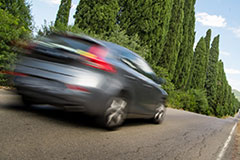Importance of Engine Braking When Going Downhill - Vol.352
There is a form of braking called engine braking that many drivers have never heard of. They have unconsciously used it and experienced it, but this braking is boring and not very sexy so no one is ever too crazy about it. There are no shiny brake discs and exotic brake pads to talk about.

Truck drivers, on the other hand, love engine braking. Most everyone who's traveled on the highway has heard the noise of an engine-braking truck. It's a series of loud popping noises (comparable to the world's loudest farts) which tractor trucks make when they slow down. These are all diesel engines but in this write-up, we'll limit the discussion to petrol engines.
What is Engine Braking
Engine braking occurs when you take your foot off the gas pedal. A certain amount of engine braking occurs naturally from friction forces between all the moving parts in the engine ? and there are lots of them.
The major portion of engine braking occurs because releasing the gas pedal would close the throttle valve. That's the engine's air intake valve that uses the butterfly valve design ? it's a large quarter-turn metal disc with spine that looks like a butterfly. Cutting off air to the manifold creates a vacuum as the remaining air is used up in combustions after combustions. The vacuum would work against the reciprocating pistons in the engine, slowing them down more and more. The slowing pistons would rotate the crankshaft slower which would in turn decrease the wheel speed.
Actually the butterfly valve is not sealed so it will still let in a tiny bit of air. The engine still has to run even when your foot is not on the gas pedal.
Occasions when Engine Braking is Useful
There are driving situations in which engine braking is useful to the point of critical at times. The most obvious usefulness of engine braking is of course when we're driving downhill. Engine braking is more effective in low gears so when we release the gas pedal and step on the brake while driving downhill, the automatic transmission would downshift and engine braking would kick in more forcefully to slow down the car even if we'renot stepping hard on the brake.
Effective utilization of engine braking shows that a driver is aware of what's ahead of him or her. It would reduce wear on the brake pads and prevent the brakes from overheating when going down a long stretch of declining road.
Another great use of engine braking is when driving in the snow, or whenever you suspect there might be black ice on the pavement. In such condition you wouldn't want to hit the brake at all or risk skidding all over the place. You would just release the gas pedal and let engine braking go to work. Needless to say, you should be driving slowly in snowy or freezing conditions and not expect engine braking to bring the car to a hard stop from speed.
Even though engine braking will make the engine run louder, it is completely safe and not harmful to the engine. Besides, engine braking in a passenger car is nowhere near as loud as in big trucks, which is why engine braking of trucks is banned in many city areas.
Besides reducing wear on the brake pads, engine braking will also improve fuel economy because your car wouldn't have to come to hard stops as with the use of assisted mechanical braking which would require you to re-accelerate by stepping on the gas pedal.